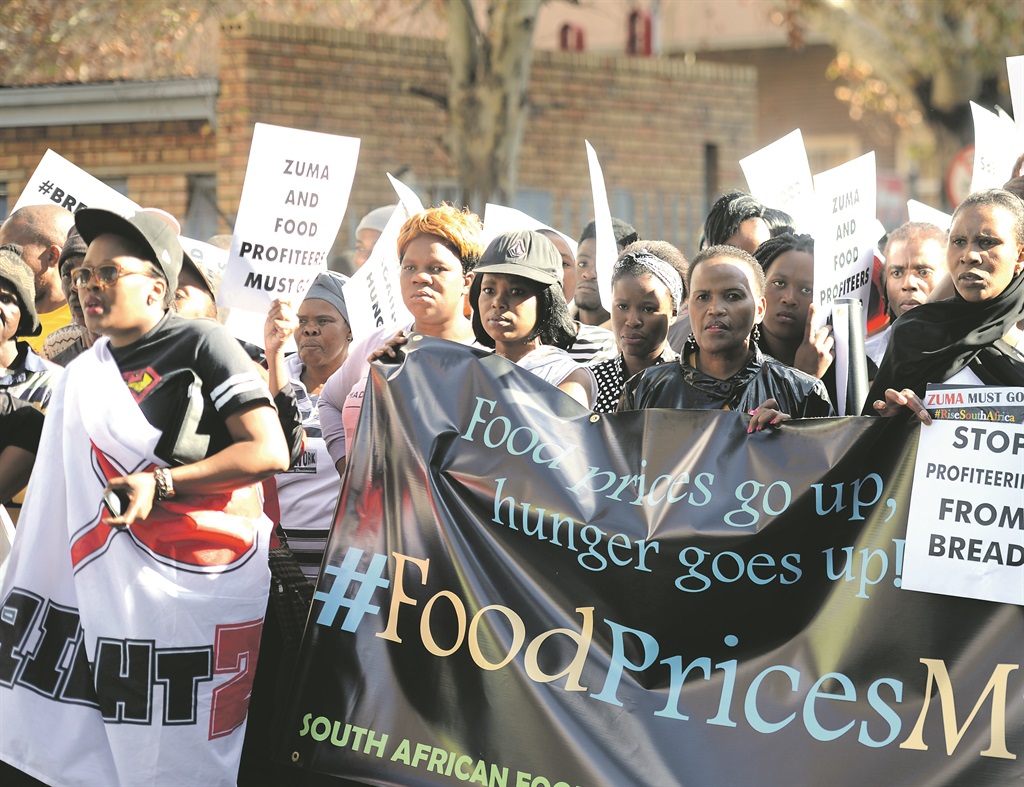
The price of bread – a staple for millions – is still rising as profiteering continues unabated, writes Vishwas Satgar
The SA Food Sovereignty Campaign this week led a bread march against hunger through the streets of Johannesburg.
In a highly unequal society, studies on the survival strategies of poor households reveal how bread and a brew of sugar and water is what keeps many people alive.
At the same time, bread is a big money-spinner for bread producers and retailers. Bread profiteering was rife in 2007 and 2010 among producers.
Premier Foods, Pioneer Foods, Tiger Brands and Foodcorp were found guilty of manipulating wheat and maize milling operations by the Competition Commission, and were rebuked in the Constitutional Court for their abhorrent conduct.
This was also in the context of globalised food system price shocks from 2006 to 2008 and from 2010 to 2011, which made it a complex issue.
Today, South Africa’s globalised food system is going through its third price shock in less than a decade. All measurements of food prices are showing a dramatic increase in inflation, with year-on-year price increases of staple foods. The increase for January 2015 to January this year was 14.6%.
The biggest increases have been in mealie meal, samp, cooking oil and potatoes, all of which are staples for the poorest people in the country.
However, bread prices have also been increasing.
A loaf of brown bread (700g) increased by 5.73% and a loaf of white increased by 5.34%.
The big food retailers are trying to make this price increase acceptable by setting these prices below food inflation increases (food inflation for March was at 9.5%, higher than headline inflation of 6.5%) and are hiding behind the weak exchange rate for imported wheat to justify bread price increases.
In this context, Grain SA has blown the whistle and is arguing that imported wheat is cheaper and therefore bread prices should actually be declining.
To understand the extent of the profiteering, more information is needed.
People’s power through disciplined and nonviolent action is crucial to secure an investigation by the Public Protector and the Human Rights Commission of bread profiteering, which is denying many citizens their right to food.
This investigation is one of the main demands of the bread march against hunger, alongside a call for bread prices and food prices – especially staple foods – to fall.
Such a demand is not unreasonable, given the massive profit made by food retailers in South Africa.
Most show annual profit of more than R1 billion. One owner – Christo Wiese of Shoprite – is the third-wealthiest person in South Africa and is worth about R25 billion.
Wealth from food corporations is increasingly concentrated, while most workers in the food system are outsourced and badly paid. The bread march against hunger will also call for an end to outsourcing and for decent work for food industry workers.
Food price increases cannot be uncoupled from the drought ravaging South Africa.
Within the first few months of this year, food inflation undermined the ameliorative effect of social grants, and is not only making malnutrition a problem (one in five children in the country are experiencing malnutrition, according to the Global Nutrition Report), but adding to learning disabilities among children.
Moreover, drought is exposing the deeper problems of a corporate-controlled food system and a state that is incapable of responding adequately.
In South Africa, according to government estimates, about 14.1 million people went to bed hungry before the drought and about 46% of the population was food insecure, revealing a major paradox of our globalised food system.
With food prices increasing and the state response coming up short, the number of hungry people has certainly increased.
The state is not tracking and measuring this.
Most political parties have not taken the drought seriously, except the DA, which wants a national disaster declared, mainly to protect the interests of commercial farmers.
The severity of a drought largely depends on preparedness and the institutional readiness of a society to respond.
A drought becomes a disaster because of the capabilities a society has to deal with it. South Africa’s response to the climate crisis is being tested in this drought.
The drought, which is part of a meteorological pattern that will certainly recur, is revealing how the government is completely unprepared to use the Disaster Management Act.
In his state of the nation address this year, President Jacob Zuma was silent on the global climate crisis, and devoid of any seriousness about the drought and its effects.
In a country in which most of our water resources are already allocated, mainly to globalised farming, and with increasing water pollution by mining corporations, water management should be a national priority, and the drought should be declared a national crisis to ensure we build greater resilience and sustainability.
South Africa’s food system was failing the country before the drought. As we enter a world of climate crisis, the insanity of killing ourselves through using fossil fuels is even more apparent.
Satgar is an associate professor of international relations at Wits and a member of the National Coordinating Committee of the SA Food Sovereignty Campaign




 Publications
Publications
 Partners
Partners








